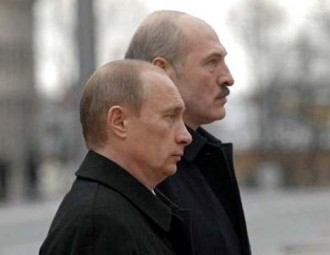Minsk is sure Kremlin will provide loans so that to keep social and economic stability in Belarus

Belarusan state counts on Russia’s aid within Belarus-Russia Union State that will cover costs of servicing public debt and maintaining economic stability during president campaign in Belarus.
In addition, the Belarusan authorities will attempt to negotiate special conditions for unrestrained access of Belarusan goods to the Russian market and to obtain the Kremlin’s guarantees to refrain from trade wars in 2015.
On March 2nd-3rd, President Lukashenka visited Russia to participate in a meeting of the Supreme State Council of the Union State. According to the presidential press service, the Supreme State Council was scheduled to consider the key issues of the Union State’s operations. President Lukashenka underscored that important issues of political and economic cooperation would be discussed.
Yet back in late January 2015, Presidents of Russia and Belarus have agreed over the telephone to hold the meeting. In particular, they “agreed on joint actions to overcome the economic problems”. In early February at a meeting with Russian Prime Minister Dmitry Medvedev, Belarusan Prime Minister Kabiakou said, that the Belarusan government was developing a bilateral Russo-Belarusan anti-crisis programme. President Lukashenka promised to present the programme at the Supreme State Council’s meeting in March. The programme envisages, inter alia, restoration of the Belarusan exports to Russia.
It is worth noting, that in 2014 Belarus’ export to Russia dropped by USD 1.5 billion. Belarusan stocks were overloaded and some large state enterprises suspended operations, due to the cutbacks in exports to the Russian market. As a result, unemployment has mounted, working hours have been reduced for 146 100 workers and 89 800 workers have been offered unpaid leave. In early 2015, exports to Russia continued to reduce – in January 2015 they were 60% of those in January 2014.
The independent media reported that in early February 2015 Belarus requested a USD 2.5 billion loan from the Russian government, officially, however, these reports have not been confirmed. Meanwhile, President Lukashenka remained confident of the Kremlin’s support: “If we suffer, Russia will lend her shoulder to us”. Russian Finance Minister Siluanov confirmed Russia’s readiness to provide financial support for Belarus. In 2015 Belarus is due USD 4 billion to repay and service her public debt, while her foreign exchange reserves totaled USD 4.7 billion in January 2015.
In addition, official Minsk is worried about yet another spiral of Russo-Belarusan trade wars amid growing recession in Russia and measures she has introduced to protect domestic market and domestic producers. The joint Russo-Belarusan anti-crisis programme should provide guarantees of free access to the Russian market for Belarusan products.
Meanwhile, experts believe, that ‘petrol’ war between Russia and Belarus is highly likely. It does not pay Belarusan refineries to export petrol to Russia due to the Russian ruble devaluation and low oil prices. However, Belarus has committed to supply 1.8 million tons of petrol to the Russian market in 2015 in exchange for 23 million tons of Russian oil and 1.5 billion worth of oil export duties. If Belarus reduces petrol supplies to Russia, the latter might review her commitments.
Official Minsk is confident that the Kremlin will provide financial and other support in order to maintain social and economic stability in Belarus in the election year. However, the Belarusan authorities are unlikely to make any significant concessions to the Kremlin regarding political and economic issues, including the privatization of state assets.
-
03.01
-
07.10
-
22.09
-
17.08
-
12.08
-
30.09








































